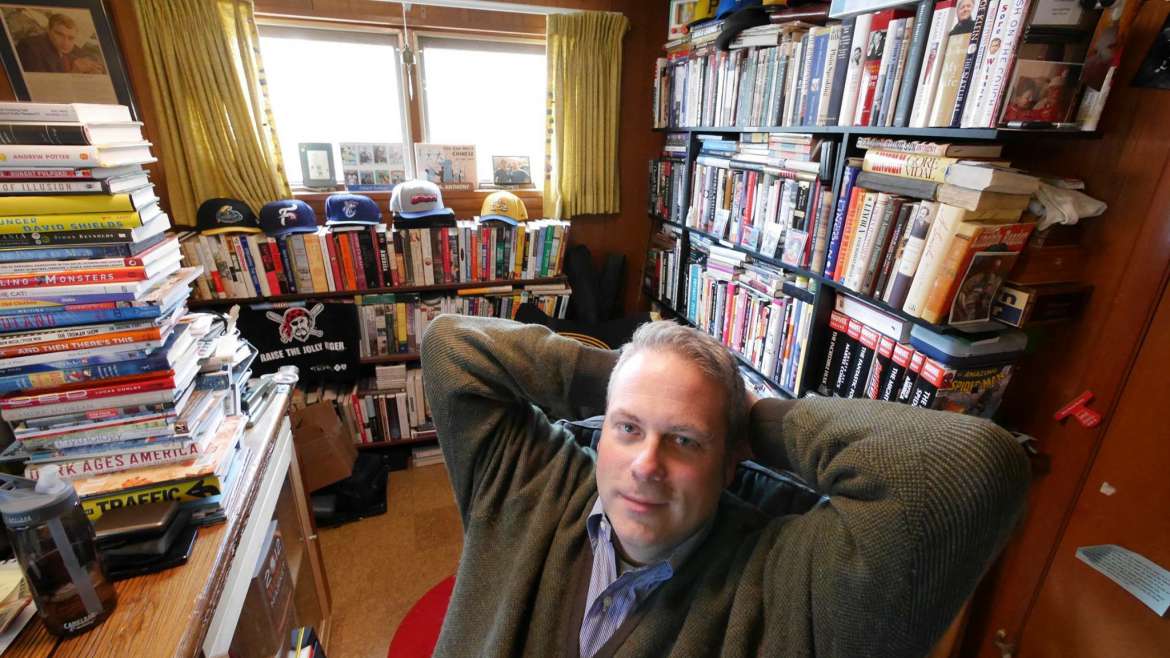Editor’s note: Prompted by the wild popularity of Marie Kondo’s “The Life-Changing Magic of Tidying Up,” I asked friends to share their perspectives on managing clutter. Ted Anthony, one of AP’s best writers, volunteered to share his contrarian view on decluttering.

A short sentence certainly has some appeal. It is succinct. It possesses clarity. It is direct. Nothing is wasted. It offers elbow room.
But then you encounter the longer sentence — the one that runs around haphazardly as Billy did in those old “Family Circus” newspaper cartoons, that spins out into a glorious pile of verbiage and carries you along for the ride, letting you feel the wind as a lexical magic carpet helps you soar to heights heretofore unseen. Adjectives and adverbs on the march, laughing and lilting and levitating their way to mellifluous altitudes as they do their jobs with the enthusiasm of a butcher’s dog.
And then suddenly you’re pulled back to Earth. Edited. Punctuated. Done.
The master stylists, the E.B. Whites of the world, will tell you that short and straightforward is to be prized. And it is. No doubt. But there’s an assumption lurking under such statements. It’s the notion that writing is intended to be efficient above all else, and that efficiency always equals elegance. There seems little room these days for what I call the roller-coaster school, the people and pens who carry you away on those aforementioned magic carpets to worlds unknown and undiscovered and deeply, unremittingly exciting. Worlds where you never know quite what you’re going to find. Those words, those tautologies, those onomatopoeic masterpieces in miniature? I make them mine.
You see where I’m going with this? I may sound like I’m talking about words, but what I’m really talking about is … clutter. Delightful, glorious, textured, memory-drenched clutter. And upon it, I am lavishing praise and accolades.
Unclutter your house, say the self-help books. Unclutter your life, say the life hackers. Unclutter your outlook for clarity and productivity, say the zenmasters who look at the joys of texture and knobbiness and see only obstacles and impedimenta.
Even the language has coalesced around the obsession with streamlining. Are you having trouble navigating your life? Must be baggage from your childhood that you have to get rid of. Baggage. As if what we carry with us is simply something to be shed, not integrated and understood.
I understand the instinct. Our world is so complicated that it’s easy to conclude we need GPS units merely to navigate our own lives (“reCALCulating…”). And yet those who tell us life is simple if only we could let it be? Well, I propose they are not dealing with the reality of clutter, be it metaphorical or physical. Clutter is, and clutter probably always will be. Casting its physical expression away doesn’t solve the problem; it treats only the symptom.
I choose to encounter clutter and make it my own. Am I a hoarder? Probably a little. I prefer the terms “collector” and “archivist,” though. They carry the elegance of scholarship and a bit of the self-righteousness of learning from the past. They allow me to tell you — and this I believe — that the tiny scraps we encounter in our travels are talismans of our lives and worthy of saving and arranging and repurposing and enjoying and, most important, passing on. That the souls of things and the souls of men and women are frequent familiars and, in many cases, inseparable friends.
I don’t want my life to be a series of short sentences. I don’t want uncluttered.
In my split-level house growing up, the upstairs was my mother’s purview. She punctuated it with the clean lines of Danish midcentury modern furniture and minimalism. Downstairs was my father’s realm, overflowing with books and papers and office supplies and souvenirs of the world and the smells of the tobacco that he brought back from his early Afghanistan travels to Harry Truman’s America so that, as Nixon steamed toward resignation two decades later, its sweet-stale aroma could waft into his young son’s nose.
I want both of those things. I want Mom AND Dad. I want the Danish furniture upstairs and the overflowing, tobacco-scented study downstairs (which is now mine). I want the short sentence and the run-on, too. I want it all, because it is all the texture of my life, compact and complicated all at once. Sure, I’ll thin the herd occasionally. I’m not an extremist. But don’t expect it to be a regular thing. It’s not in my nature.
Let simplicity and streamlining be your salvation if you wish; that is your business. But clutter is my clarity. And if you’ll excuse me now, I have to go deal with my baggage. By which I mean I need to go rip last month’s luggage tags from Laos off of my suitcase. The scrapbook is waiting.
Related posts:

In praise of memory-drenched clutter — a guest post by Ted Anthony
